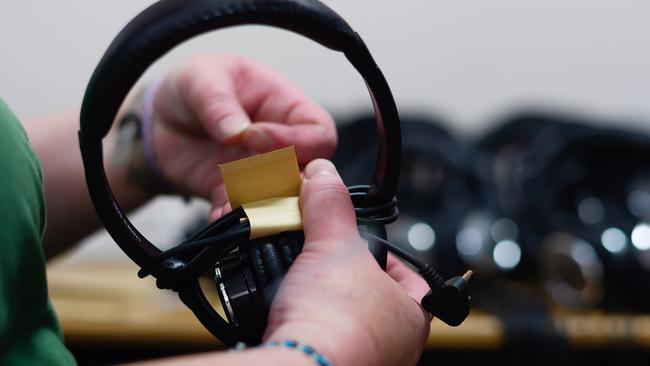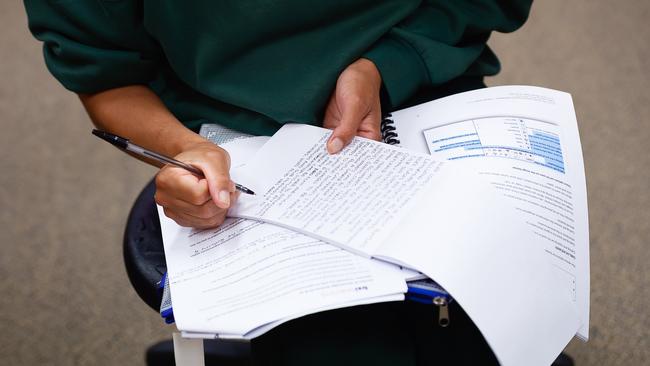More prisoners learning to read and write after education reforms
The rate of inmates completing numeracy and literacy courses behind bars has soared on the back of controversial prison education reforms introduced two years ago which cut back some art and music classes.
NSW
Don't miss out on the headlines from NSW. Followed categories will be added to My News.
Our worst criminals — murderers, rapists and drug runners — are going back to school in record numbers while serving hard time.
The rate of inmates completing numeracy and literacy courses has soared by 77 per cent on the back of controversial prison education reforms introduced two years ago.
The changes included Correctives Services deleting some art and music classes to focus on basic reading and writing in the hope of boosting employability beyond convict life.

MORE NEWS
Monopoly the key to becoming a maths whiz
Wild Wayside Christmas with the Turnbulls
‘Sirens blaring, then I was stranded in my bikini’
Sharon, a 52-year-old inmate in partial segregation, was terrified and unable to read her own name when she arrived on a lengthy sentence at Dillwynia Correctional Centre, near Windsor.
“I was scared when I came in, I didn’t talk to the officers, I didn’t talk to no one. I didn’t know how to read or write, now I can,” Sharon told The Daily Telegraph.
“When I get out, I really want to go and work with my sister.”
Sharon is “employed” at $24.60 per week in a team of inmates who fix and repackage used Qantas headsets as part of the prison system’s vast internal workforce.
It is coveted paid positions like Sharon’s which entice prisoners to achieve a basic education.
The jail’s other most sought-after jobs include trainers for the jail’s two resident greyhounds and checkout staff in the on-site “supermarket”.
“We can’t have someone that can’t read and write English working in here, it’s too hard,” Dillwynia’s principal industries officer Cath Avery said.
She said packing prison groceries was a high-stakes game — each inmate gets one order a week and ponders deeply over every purchase.
Chocolate, cans of Coke, soap, instant noodles and Nicorette — at $10 a packet — are in huge demand. And with a weekly budget up to $100 prisoners can horde the tiny luxuries.
But unless prisoners have financial assistance from the outside they are restricted to their weekly income, if they have one.

With distractions like drug use, and even jailhouse romances, Ms Avery said learning and employment was critical to filling in the hours between 7am and 3pm.
“One, you want to improve their skills so they’re employable when they get out. Two, it’s about letting them earn a little bit of income and three, it’s about reducing the boredom,” Ms Avery said.
She said even the state’s most heinous female offenders deserved education opportunities in jail.
“You can’t let your heart rule your head. I’m a parent, I have kids and some of these inmates I work with have done inappropriate things to children, but I treat the inmate for what I see in front of me. I’m not their judge, I’m not their jury,” Ms Avery said.

The number of inmates to complete literacy and numeracy qualifications increased from 322 per year to 459 between 2015-2016 and 2017-2018, while those in vocational training programs leapt from 2,978 to 5,269 in the same period.
The changes, which outsourcing the prison teaching services to TAFE and private educator BSI Learning, have been criticised by the NSW Teachers Federation for employing teachers without tertiary degrees.
But Minister for Corrections David Elliott said the fact the prison system was below capacity for the first time in years was proof the changes were addressing recidivist offending.
“People should leave prison feeling punished so they don’t go back, drug free so they don’t risk a like of crime and literate so they can get a job,” Mr Elliott said.
“When we came into government after 16 years of Labor, only one per cent of inmates were actually completing education programs they commenced,” Mr Elliott said.
“It wasn’t good enough and was a waste of taxpayer money. Our model targets inmates who lack the basic skills to get a job.”
Originally published as More prisoners learning to read and write after education reforms


